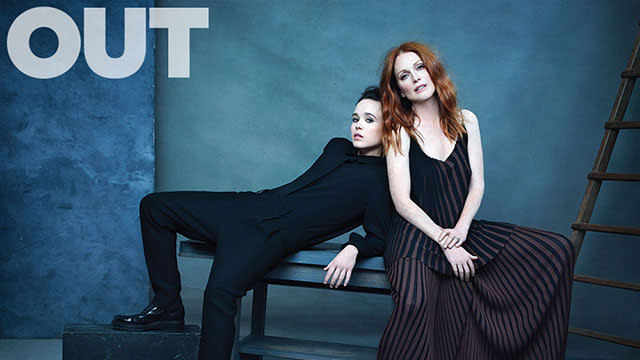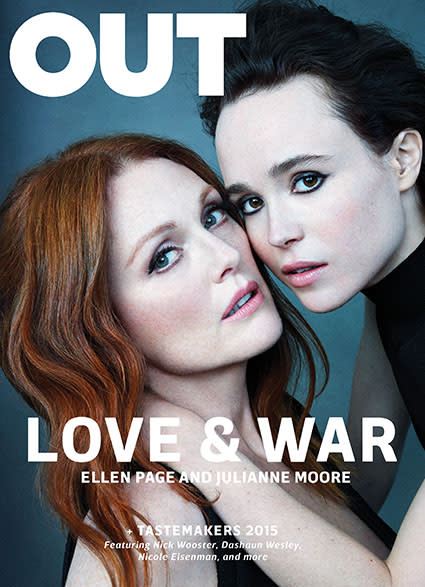How Ellen Page Taught Julianne Moore About the Pains of Being Closeted

For Ellen Page, starring in the feature-length adaptation of Cynthia Wade's documentary Freeheld meant a real-life struggle with her own sexuality and coming out publicly.
"I remember thinking, 'Ellen, how in God's name could you make this film and not be out?'" Page told Out Magazine for their October issue.
NEWS: Ellen Page Says It's 'Offensive' When Straight Actors Are Called Brave for Playing Gay
The actress was involved with the development of the project for several years before production began in October 2014 and as the movie evolved, so did the her views on going public with her sexuality.
"What's interesting to me is how long it took to make the movie -- for it to finally come together -- and how my internal progression toward coming out was naturally in line with it," she told Out. "Stacie and Laurel's story is incredibly inspiring. It made me go, 'Dude, just tell people you're gay. Just get over yourself, honestly, and support those who are not as privileged. It's like, You have f**king privilege, so do something with it.'"
Page came out publicly at the Human Rights Campaign's THRIVE conference in February 2014, then jumped headfirst into the role of Stacie Andree, domestic partner of New Jersey police officer Laurel Hester, played by Julianne Moore. The film follows Hester's fight against the Ocean County, New Jersey, Board of Chosen Freeholders to have her pension benefits transferred to Andree when she is diagnosed with terminal cancer.

Out Magazine
"For me, lots of stuff surfaced [playing Stacie]. Recreating a sort of closeted relationship in a film caused some stuff to surface, for sure," Page told Out. "And then there's [the matter] of speaking up or potentially owning an identity that I think does require a responsibility of trying to help move things forward."
WATCH: Ellen Page Confronts Ted Cruz in Person on LGBT Discrimination
"For Stacie, it was more complicated, because her being fully involved in that activism meant accepting that the love of her life was going to die," she added. "But when she finally managed, in some way, to accept that idea, I think she could fully give herself to the activist part of it all."
Moore also opened up in the magazine about how her co-star's struggle with coming out helped her embrace her role in the film.
"Ellen had so recently come out, and this is going to sound silly, and hopefully not hurtful, but I don't think I was aware of how painful it is to be closeted," Moore admitted. "I have the advantage of being a person who's never had to hide my sexuality, so I asked her a lot of questions—frank questions—about what that feels like. She said she felt discomfort simply wearing all these dresses, and it was all very eye-opening for me. She was so unprotective [of herself] – I was very touched by that. It definitely made me more sensitive to the nuances of our movie."
NEWS: Ellen Page On Coming Out: I Don't Have To Wear Dresses Anymore
Page recently spoke frankly about straight actors playing LGBT characters in film or on television, telling Time, "When people are [called] brave in regards to playing LGBTQ people, that's borderline offensive. I'm never going to be considered brave for playing a straight person, and nor should I be."
The actress went on to explain that she felt a "deep sense of peace" on the Freeheld set. "There was something about being out, getting to play a gay character, and getting to play a woman who is so inspiring to me—it was such an amazing experience for me," she says. "Honestly, if I played gay characters for the rest of my career, I'd be thrilled. I wish I could, honestly!"
Out Magazine's October issue hit newsstands on Sept. 15.
WATCH: Ellen Page Thanks Ellen DeGeneres For Coming Out 'When It Was Much Harder'
Related Articles

